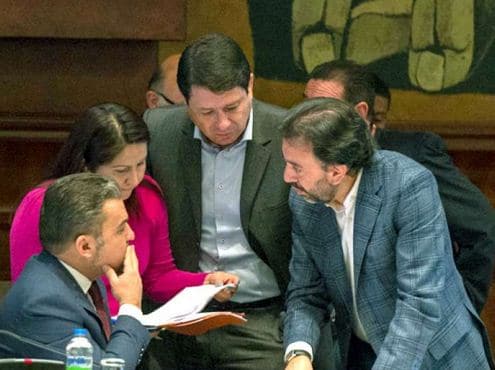Moreno gets big win as National Assembly votes to let private banks manage digital money system
The management of Ecuador’s digital money system will be turned over to private banks. The National Assembly approved a line item veto by President Lenin Moreno on Wednesday to allow the system, currently administered by Ecuador’s Central Bank, to be run by the private sector.

Assemblyman Pabel Muñoz (left) talks to Assembly President José Serrano following Wednesday vote. (El Telegrafo)
The 82 to 29 vote, which reversed earlier action by the Assembly to keep control of the system at the Central Bank, is one of Moreno’s first major legislative victories.
It was also a victory over the Correista faction of Moreno’s Alianza País party, which opposed the change.
The shift of system management from public to private hands was proposed in Moreno’s Economic Reactivation bill but was not included in legislation passed in early December. In his partial veto, the president insisted that the change be reinstated.
Assemblywoman Gabriela Larreátegui said the change was necessary and overdue. “The digital money plan has been a disaster since it was introduced by President Correa and his people three years ago,” she said. “It was an attempt by the government to control the money supply and force people to accept more government control. The people didn’t trust it and the program was flop.”
Among those opposing the change was Assemblyman Pabel Muñoz, who said taking the system out of government control is a mistake. “We cannot trust the private financial system to fairly run the program. The original plan was a good one but it needed reorganization.”
Rolled out to great fanfare by the government in 2013, the digital cash system, which operates by cell phone, has been a resounding failure with the public, attracting less than 10% of the predicted users. When it was announced, the Central Bank estimated that the system would have 600,000 users by the beginning of 2017. Instead, It had only 52,000 accounts, the majority of them inactive.




















